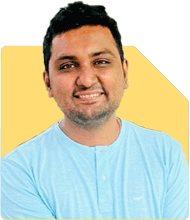Mayank Rautela | Answer |Ask -Follow
HR Expert - Answered on May 18, 2022
A management graduate from the Symbiosis Institute of Management Studies with a master's degree in labour laws from Pune University, Rautela has over 20 years of experience in general management, strategic human resources, global mergers and integrations and change management.... more

Hello Mayank.
I came across your article on Rediff.com. Impressed, am trying to reach you out for some guidance.
I am a lawyer from India, still enrolled at the bar. However, I moved to Australia in 2007 and now an Australian citizen working with a law firm since past seven years.
Now wish to return home (India) where I do not have any contacts. Hyderabad is where my parents are so considering this place. However, not ruling out other places.
What in your opinion should be my plan of action? Am 49.
I am unsure if you provide career advice/charge professional fees. If you do not, then a suitable reference will be appreciated.
I wish to stay anonymous until I succeed in what I intend doing.
Thank you kindly.
Hi.
Thank you.
Before I begin, let me first clarify that I do not assist the readers of this column with specific job opportunities.
In your case, you must use social platforms like LinkedIn to connect with companies/professionals who can help you get a suitable role.
Since you have been away from India for a while, you might want to do a course to update yourself about Indian laws.
Alternately, you can look for jobs in companies based in India that specialise in international law.
You may like to see similar questions and answers below
Abhishek Shah | Answer |Ask -Follow
HR Expert - Answered on Aug 22, 2023
Abhishek Shah | Answer |Ask -Follow
HR Expert - Answered on Jan 07, 2024
Krishna Kumar | Answer |Ask -Follow
Workplace Expert - Answered on Feb 29, 2024
Nayagam P P |10859 Answers |Ask -Follow
Career Counsellor - Answered on Feb 20, 2025
Ramalingam Kalirajan |10906 Answers |Ask -Follow
Mutual Funds, Financial Planning Expert - Answered on Dec 19, 2025
Nayagam P P |10859 Answers |Ask -Follow
Career Counsellor - Answered on Dec 19, 2025
Ramalingam Kalirajan |10906 Answers |Ask -Follow
Mutual Funds, Financial Planning Expert - Answered on Dec 19, 2025
Ramalingam Kalirajan |10906 Answers |Ask -Follow
Mutual Funds, Financial Planning Expert - Answered on Dec 19, 2025
Ramalingam Kalirajan |10906 Answers |Ask -Follow
Mutual Funds, Financial Planning Expert - Answered on Dec 19, 2025
Radheshyam Zanwar |6751 Answers |Ask -Follow
MHT-CET, IIT-JEE, NEET-UG Expert - Answered on Dec 19, 2025
Radheshyam Zanwar |6751 Answers |Ask -Follow
MHT-CET, IIT-JEE, NEET-UG Expert - Answered on Dec 19, 2025
Samraat Jadhav |2514 Answers |Ask -Follow
Stock Market Expert - Answered on Dec 18, 2025
Reetika Sharma |432 Answers |Ask -Follow
Financial Planner, MF and Insurance Expert - Answered on Dec 18, 2025
Reetika Sharma |432 Answers |Ask -Follow
Financial Planner, MF and Insurance Expert - Answered on Dec 18, 2025


























